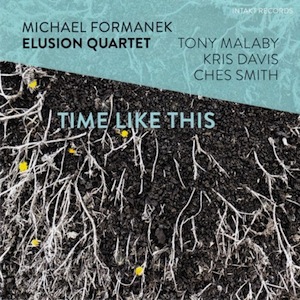Label: Toy Piano Records, 2018
Personnel – Florian Ross: piano; Kristin Berardi: vocals; Matthew Halpin: saxophones; Dietmar Fuhr: bass; Hans Dekker: drums.
Florian Ross is a German pianist, composer, and arranger whose debut as a leader goes back to 1998. Since then, he has dedicated much effort and attention to small and large ensembles, but you could still find him arranging pieces for Martial Solal with WDR Big Band and Craig Brenan, orchestrating for the Scottish National Jazz Orchestra, or playing Hammond in Nils Wogram’s Nostalgia project.
Presently, he put together a cross-country, inter-generational quintet, featuring Australian singer Kristin Berardi, Irish saxophonist Matthew Halpin, and Dutch drummer Hans Dekker. Rounding out the group is German bassist Dietmar Fuhr, a longtime co-worker. The resultant output is a 12-track record entitled Swallows & Swans.
Deliciously nuanced in tempo and rhythm, “Midway” is first introduced by Dekker’s brushes, to which piano cascades and voice/saxophone unisons are gradually added. Not being a ballad, the tune, nonetheless, surrounds itself by a velvety smoothness that is maintained even after the flow is rearranged.
In opposition to the lamenting tones of “Horologue of Eternity”, which features the words of American poet Henry Wadsworth Longfellow by the voice of Ms. Berardi, “Recurring Dream” lives in a weightless state of bliss, carrying a patiently built piano solo and reaching a climax with Halpin’s impressionistic soprano narrative.
The catchy riff at the center of “Solid Air” is firstly echoed and then occasionally revisited. The drummer’s rich pulsation becomes more salient here than in the previous tunes, especially during the strong solo contributions from saxophone and piano.
Sometimes lyrics can be a limiting factor for me and maybe that’s why the melancholic “Looking Inward” and “The Silver Swan” didn’t impress me all that much. Their musical nature is worthy of a Disney movie soundtrack, though. Conversely, “Cold Smoke”, a showcase for nimble piano movements in counterpoint with the bass, radiates light through the charming vocalization of Berardi, who is all the more convincing on “Albatros”, a piece airing a familiar Latin vibe, and “Trip To The Watercooler”, a dashing post-bop ride.
Taking simple and direct routes for most of its duration, the album comes to an end with a glossy voice-piano duo version of the traditional Irish song “The Lark In The Clear Sky”.
Grade B-
Favorite Tracks:
01 - Midway ► 05 - Solid Air ► 08 - Albatros








































